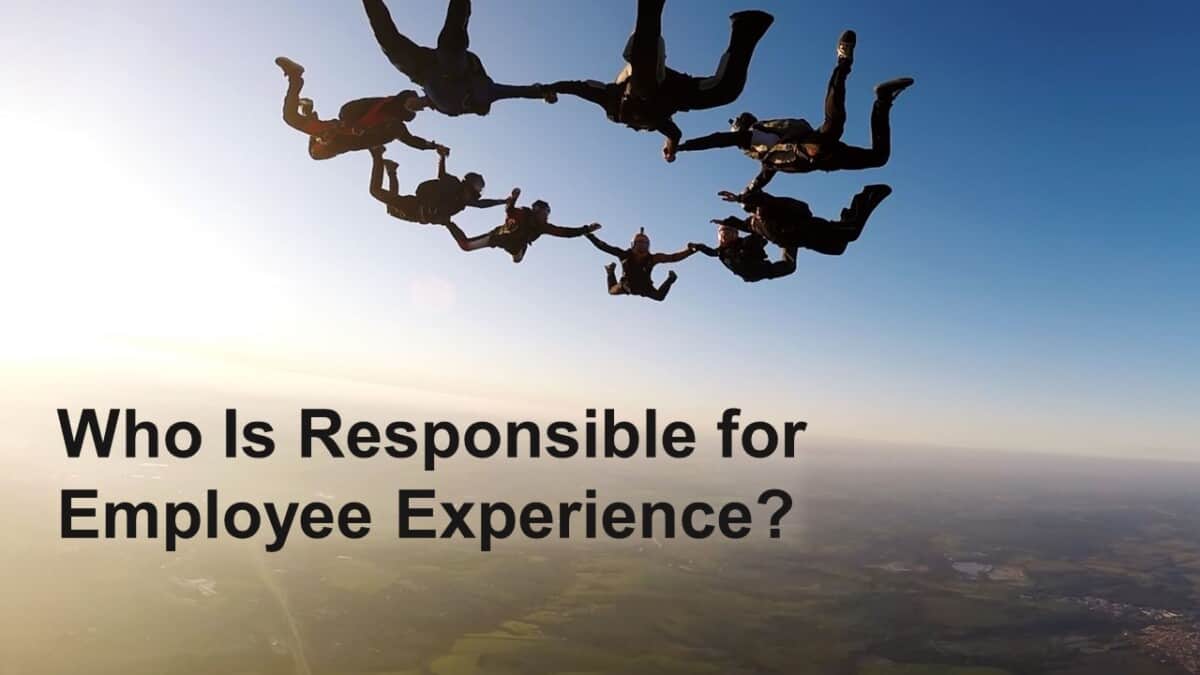Share:

Employee experience has been a hot topic recently and for good reason. It can have a tremendous impact on a number of business outcomes. Interest in the employee experience and how it can be improved indicates that organizations are becoming more aware of the need to create work environments and experiences that team members truly want to be a part of.
Unfortunately, despite all the recent attention given to the subject, there is no blueprint or one-size-fits-all approach to how to provide an exceptional employee experience, and we are still figuring out the best, most effective strategies.
One of the most important questions we have to answer as we navigate this complex process is this: who is responsible for employee experience?
As it turns out, even the answer to this question is a bit complex.
In many organizations, HR is responsible for employee experience, with some organizations hiring employee experience managers. But it’s not just HR’s responsibility. Positively shaping the employee experience requires a collective effort and the guidance of a skilled leader who’s committed to employee success.
In this article, I’ll delve into the complexities of employee experience and how a collective approach and organization-wide ownership of the employee experience process can be the best strategy for managing it.


Employee Experience Explained
An employee experience consists of all the interactions that happen during the employee lifecycle, the experiences that involve an employee’s specific role, and how they feel about these experiences.
It includes (but is not limited to) the employee’s experience of the recruitment process, onboarding, performance management, day-to-day encounters with co-workers, managers, senior leadership, and customers, the work environment, the workplace culture, the technology they use, the exit interview process, and any interactions the employee has with the employer after the employee leaves the organization.
All these factors affect an employee’s well-being, job satisfaction, engagement, motivation, productivity, and performance, which can affect a business’s overall performance, retention rates, and profitability.
Is HR Responsible for Employee Experience?
Yes. And… no. I’ll explain.
HR departments manage many of the functions and processes that impact employee experience and play a role in guiding the entire employee experience, from the moment a candidate applies for a job with the organization to the moment they conduct the employee’s exit interview.
However, according to Forbes contributor Jacob Morgan, it’s not solely the responsibility of HR:
“In every single organization that I have worked with or researched, this is owned by HR. But with a caveat. Even though HR owns the employee experience it’s not just up to HR to create this. In soccer, the goalie owns any soccer ball that comes flying at the net but it’s actually everyone’s job to keep the ball from going into their own goal, if it does, the whole team (not just the goalie) loses. The same is true for employee experience. Although HR is being tasked as the employee experience torch bearer this isn’t just an HR responsibility.”
Since the employee experience is made up of all an employee’s day-to-day interactions with members of an organization, all members of an organization are part of the employee experience and impact it in one way or another. Therefore, employee experience is the responsibility of everyone in the organization.
Employee experience is created whether or not an organization has an HR department. Ideally, a company will have a designated team that is focused on creating the desired employee experience, but we know this is not the case for every company out there.
While every company has some HR-related duties to fulfill, not every company has a designated HR department, and they are not required to. Some companies often just have one individual who handles HR duties for the entire company, along with other leadership or managerial duties. In this scenario, it becomes even more crucial for the employee experience to be a team effort.
What is an Employee Experience Manager?
Many companies have taken to hiring employee experience managers. Employee experience managers are typically part of HR departments.
Employee experience managers develop strategies that help them understand employee sentiments and satisfaction so they can effectively manage the entire employee experience for an organization, including recruitment, development, coaching, and retention.
They gauge employee attitudes toward their jobs and their level of satisfaction by utilizing tools like employee surveys, feedback, rewards, and KPIs for tracking and improving employee engagement, performance, and productivity.
The goal is to identify employee needs and foster a positive work environment and organizational culture where employees feel a sense of belonging and are equipped with what they need to perform well.


How Leaders Shape Employee Experience
Whether your organization has hired an employee experience manager or does not even yet have employee experience on its radar, the organization’s leadership will profoundly impact the employee experience of all its employees, for better or worse.
Leadership affects the employee experience more than any other factor because of the way leadership defines organizational culture. An employee’s day-to-day interactions with their direct supervisor or manager, in particular, affect an employee’s experience in negative and positive ways, depending on the quality of those interactions.
Good leaders consistently communicate cultural norms in ways that create a positive work environment where employees are engaged, have a high degree of loyalty, and feel a sense of purpose in their work. They reinforce core values by modeling behaviors that are consistent with core values and embody the organization’s culture in every aspect of their leadership.
While a more traditional approach to leadership that emphasizes hierarchy, control, and stability may seem comfortable to some and more reliable because it yields consistent, predictable results in the short term, it’s not the best approach to creating a positive employee experience.
Traditional leadership approaches may give you the results you want now, but they can have a less predictable and less favorable impact on employee experience because they are more focused on business outcomes than on how we as leaders should lead and develop employees to do their best work and achieve the desired business outcomes.
But if you want your team to achieve positive business outcomes, the best way to do that is by supporting a positive employee experience.
Shaping Employee Experience Is a Collective Effort
Everybody in the organization is responsible for employee experience. This is an important fact to keep in mind when recruiting. Hiring for cultural alignment and ensuring the organization is providing a welcoming, inclusive work environment for all can go a long way.
Employees need to feel a sense of belonging and psychologically safe to engage, collaborate, and do their best work. Building inclusive teams that support each other and are invested in creating a positive employee experience for all is the key to good employee experience management.
When the interactions that make up the employee experience are positive, it improves job satisfaction and reduces turnover, as employees who experience support from their co-workers are more likely to stay with an organization for the long haul.
Having supportive co-workers can also boost the employee experience in the form of “daily uplifts”—positive experiences in the workplace that make employees feel good. These micro-experiences include receiving positive feedback about performance, recognition from a supervisor, or just having positive mutual exchanges with co-workers.

Matt Tenney has been working to help organizations develop leaders who improve employee engagement and performance since 2012. He is the author of three leadership books, including the groundbreaking, highly acclaimed book Inspire Greatness: How to Motivate Employees with a Simple, Repeatable, Scalable Process.
Matt’s ideas have been featured in major media outlets and his clients include numerous national associations and Fortune 500 companies.
He is often invited to deliver keynote speeches at conferences and leadership meetings, and is known for delivering valuable, actionable insights in a way that is memorable and deeply inspiring.


